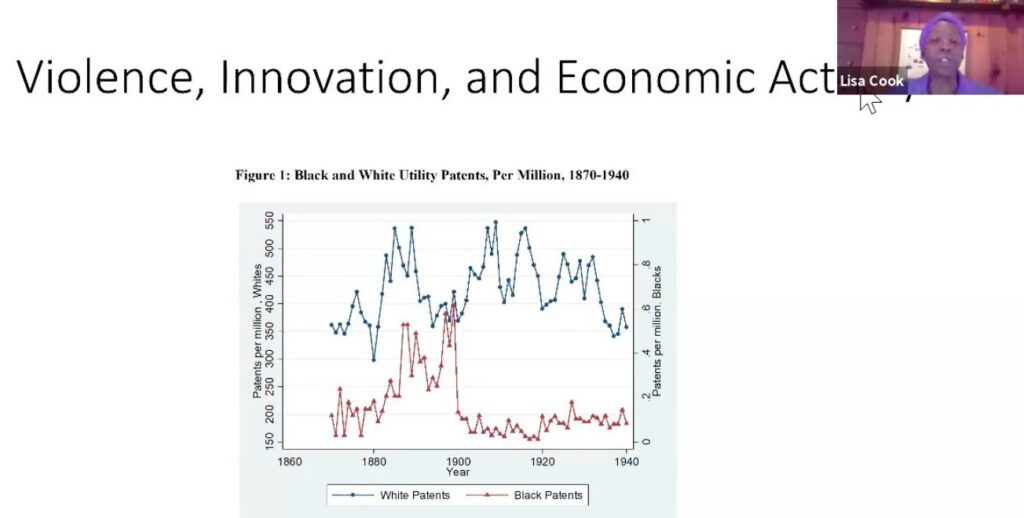Summary:
Guest post by Jeff Mosenkis of Innovations for Poverty Action Professor Lisa Cook explains that black and white inventors put in equivalent numbers of patent applications once in 1899, and never again. First, a great webinar by Professor Lisa Cook, former economic advisor to President Obama, among many other accomplishments, on how lynchings, violence, and discrimination caused African-American inventions (measured by patent applications) to peak in 1899 and never recover. Here’s the video and slides, but for a fast summary, I did my best to live tweet it. She covered a lot of ground, but some parts that stuck with me in particular: The number of “missing” patents never filed because of the decreased numbers is on the order of the contribution of a medium-sized European country. It’s
Topics:
Jeff Mosenkis (IPA) considers the following as important: academia, contracts, Crime, development, Economics, history, links, miscellany, news, podcast, podcasts, police, Policing, race, Unions
This could be interesting, too:
Guest post by Jeff Mosenkis of Innovations for Poverty Action Professor Lisa Cook explains that black and white inventors put in equivalent numbers of patent applications once in 1899, and never again. First, a great webinar by Professor Lisa Cook, former economic advisor to President Obama, among many other accomplishments, on how lynchings, violence, and discrimination caused African-American inventions (measured by patent applications) to peak in 1899 and never recover. Here’s the video and slides, but for a fast summary, I did my best to live tweet it. She covered a lot of ground, but some parts that stuck with me in particular: The number of “missing” patents never filed because of the decreased numbers is on the order of the contribution of a medium-sized European country. It’s
Topics:
Jeff Mosenkis (IPA) considers the following as important: academia, contracts, Crime, development, Economics, history, links, miscellany, news, podcast, podcasts, police, Policing, race, Unions
This could be interesting, too:
Lars Pålsson Syll writes Schuldenbremse bye bye
Lars Pålsson Syll writes What’s wrong with economics — a primer
Lars Pålsson Syll writes Krigskeynesianismens återkomst
Lars Pålsson Syll writes Finding Eigenvalues and Eigenvectors (student stuff)
Guest post by Jeff Mosenkis of Innovations for Poverty Action

Professor Lisa Cook explains that black and white inventors put in equivalent numbers of patent applications once in 1899, and never again.
- First, a great webinar by Professor Lisa Cook, former economic advisor to President Obama, among many other accomplishments, on how lynchings, violence, and discrimination caused African-American inventions (measured by patent applications) to peak in 1899 and never recover. Here’s the video and slides, but for a fast summary, I did my best to live tweet it. She covered a lot of ground, but some parts that stuck with me in particular:
- The number of “missing” patents never filed because of the decreased numbers is on the order of the contribution of a medium-sized European country. It’s hard to imagine what innovations and prosperity we’ve all missed out on.
- Prof Cook mentioned in passing that a cousin helped found a town in North Carolina intended as a safe place for African-Americans to live and prosper without harassment. The story of Soul City, NC is fascinating.
- The most compelling part of the story wasn’t even in the webinar. It was her decade-long uphill battle to get the paper published, and what it tells us about the field of economics, which she explains to Planet Money’s The Indicator (Apple).
- The NYTimes has a piece explaining the problems with the culture of economics, and Dania Francis & Anna Gifty Opoku-Agyeman offer three tips for the field in Newsweek
- The Sadie Collective has recommendations for what institutions and individuals in the field can do better.
- The best piece I’ve read on how subtle assumptions about race get absorbed into economists’ reasoning is this from Professor William Spriggs.
- How the field got to be the way it is is a bit easier to understand if you read this horrible piece by George Stigler in1962: The Problem of the Negro.
If you haven’t seen it yet, this was a great explanation for the general US culture:
- Kimberly Jones’ Monopoly game metaphor reminds me of this Howard French brilliant deconstruction of a UK historian’s book (gated, sorry) about African history. French shows that Europeans destroyed sophisticated civilizations and hollowed out countries’ populations for hundreds of years by dragging away the workforce, and today cast about for roundabout theories for why they’re “underdeveloped”
- I’m side-eyeing historians, but also hard to ignore the asymmetry in where development economists’ ideas come from, and the assumption that countries where the rich people are also must know how to get rich.
Along those lines, here’s a great piece by Francesco Loiacono, Mariajose Silva-Vargas, & Apollo Tumusiime (written before the pandemic) about how research designs can be more sensitive and less biased by the views of the researchers (better informed consent, for example, and not assuming their programs happen in a vacuum, or realizing that local politicians may swoop in and take credit for cash transfers). (h/t David McKenzie’s links) - Today, I learned that the UK’s abolition of slavery was accomplished through paying the slaveowners for their lost “property,” to the tune of today’s $17 Billion (and requiring an additional 5 years of unpaid labor, which I feel like there’s a name for…) British taxpayers just finished paying back that borrowed money in 2015, which means that descendants of slaves have been paying back their own ancestors’ slavemasters.
- Jennifer Doleac put together a series of flash webinars on policing research, more info here.
- A series of simple police reform ideas in this article and tweet thread on how to fix many policing problems by looking at financial incentives, moving the benefit of the “taxes” levied disproportionally on the poor by the criminal justice system away from the local municipalities (revenues from fines, seized assets, and the like) and redistributing them at the state level, prioritizing the poor.
